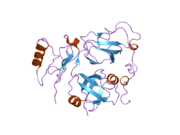NPLOC4
Appearance
(Redirected from Nploc4)
Nuclear protein localization protein 4 homolog is a protein that in humans is encoded by the NPLOC4 gene.[5][6][7]
Interactions
[edit]NPLOC4 has been shown to interact with UFD1L.[5][8]
References
[edit]- ^ a b c GRCh38: Ensembl release 89: ENSG00000182446 – Ensembl, May 2017
- ^ a b c GRCm38: Ensembl release 89: ENSMUSG00000039703 – Ensembl, May 2017
- ^ "Human PubMed Reference:". National Center for Biotechnology Information, U.S. National Library of Medicine.
- ^ "Mouse PubMed Reference:". National Center for Biotechnology Information, U.S. National Library of Medicine.
- ^ a b Botta A, Tandoi C, Fini G, Calabrese G, Dallapiccola B, Novelli G (Sep 2001). "Cloning and characterization of the gene encoding human NPL4, a protein interacting with the ubiquitin fusion-degradation protein (UFD1L)". Gene. 275 (1): 39–46. doi:10.1016/S0378-1119(01)00649-7. PMID 11574150.
- ^ Meyer HH, Shorter JG, Seemann J, Pappin D, Warren G (Jun 2000). "A complex of mammalian Ufd1 and Npl4 links the AAA-ATPase, p97, to ubiquitin and nuclear transport pathways". EMBO J. 19 (10): 2181–92. doi:10.1093/emboj/19.10.2181. PMC 384367. PMID 10811609.
- ^ "Entrez Gene: NPLOC4 nuclear protein localization 4 homolog (S. cerevisiae)".
- ^ Lass A, McConnell E, Fleck K, Palamarchuk A, Wójcik C (Aug 2008). "Analysis of Npl4 deletion mutants in mammalian cells unravels new Ufd1-interacting motifs and suggests a regulatory role of Npl4 in ERAD". Exp. Cell Res. 314 (14): 2715–23. doi:10.1016/j.yexcr.2008.06.008. PMID 18586029.
Further reading
[edit]- McConnell E, Lass A, Wójcik C (2007). "Ufd1-Npl4 is a negative regulator of cholera toxin retrotranslocation". Biochem. Biophys. Res. Commun. 355 (4): 1087–90. doi:10.1016/j.bbrc.2007.02.077. PMID 17331469.
- Gevaert K, Goethals M, Martens L, Van Damme J, Staes A, Thomas GR, Vandekerckhove J (2004). "Exploring proteomes and analyzing protein processing by mass spectrometric identification of sorted N-terminal peptides". Nat. Biotechnol. 21 (5): 566–9. doi:10.1038/nbt810. PMID 12665801. S2CID 23783563.
- Nagase T, Kikuno R, Ishikawa K, Hirosawa M, Ohara O (2000). "Prediction of the coding sequences of unidentified human genes. XVII. The complete sequences of 100 new cDNA clones from brain which code for large proteins in vitro". DNA Res. 7 (2): 143–50. doi:10.1093/dnares/7.2.143. PMID 10819331.









